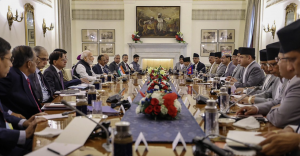New Delhi, Jun 1: The boundary dispute and other issues will be resolved in this spirit as India and Nepal work to elevate their relationship to Himalayan heights, said Prime Minister Narendra Modi, who spoke with his colleague Pushpakamal Dahal ‘Prachanda,” on Thursday. After the talks, Modi released a statement to the media in which he claimed that he and Prachanda had made a number of crucial choices that would make their cooperation a “super hit” in the future, even as they remotely launched several initiatives and laid the cornerstone for others.The expansion of the cross-border oil pipeline, the creation of integrated checkpoints, and enhancing collaboration in hydroelectric power were just a few of the seven agreements that the two sides inked.
The updated transit treaty between India and Nepal was one of the major agreements concluded.”We’ll keep trying to reach Himalayan heights in our relationship. And in this spirit, we will settle all disputes, whether they are boundary-related or not, Modi remarked in Prachanda’s presence.
Modi also mentioned that after becoming prime minister nine years ago, he made fostering relationships with Nepal a priority.
“I recall that in 2014, three months after taking office, I travelled to Nepal for the first time. The ‘hit’ formula I offered at the time for enhancing relations between India and Nepal was highways, interstates, and trans-ways. Modi stated= .In order to prevent our borders from acting as a barrier to one another, he stated, “I had said that we will establish a relationship between India and Nepal.”
After nine years, Modi said he was pleased to declare that “our partnership has been really a ‘hit’.” Following their discussions, the two leaders essentially opened integrated checkpoints in Nepalgunj and Rupaidiha, India. Additionally, they essentially flagged off a goods train from Bathnaha in Bihar to the Nepali customs yard.PM Prachanda and I determined that projects relating to the Ramayana circuit should be hastened in order to further promote cultural and religious links, Modi stated.
Prachanda stated in his remarks that he and Modi had a “extensive review” of the development in their relationship and reaffirmed their commitment to fortifying their ties and working together.
The prime minister of Nepal expressed his appreciation for Modi’s “neighbourhood first policy”.”Nepal and India have long-standing and complex relations. This relationship is based on a strong foundation created by the two nations’ steadfast adherence to the time-tested principles of sovereign equality, reciprocal respect, understanding, and cooperation, as well as by the long history of societal, cultural, and economic ties between them.
According to him, the two sides talked about ways to increase their collaboration in a variety of areas, including trade, transit, investment, hydropower, power trade, irrigation, power transmission lines, petroleum pipeline extension, building integrated checkpoints, and connectivity for land and air travel.”Under PM Modi’s capable leadership, India’s economic and development environment has seen a tremendous transition. I extend my congratulations to Prime Minister Modi on his completion this week of nine years in office with significant accomplishments on numerous fronts, Prachanda remarked.
On a four-day visit, the Nepalese president landed here on Wednesday.
In terms of India’s general strategic interests in the area, Nepal is significant, and the leaders of the two nations frequently discuss their long-standing “Roti-Beti” relationship, which alludes to unions of citizens from two different countries.Sikkim, West Bengal, Bihar, Uttar Pradesh, and Uttarakhand are five of the five Indian states that make up the country’s 1,850+ km border.
India is a major source of transportation for Nepal, a landlocked country.
Nepal imports a sizable portion of its needs from and via India, which gives Nepal access to the sea.
The foundation of the unique ties between the two nations is the 1950 India-Nepal Treaty of Peace and Friendship.

